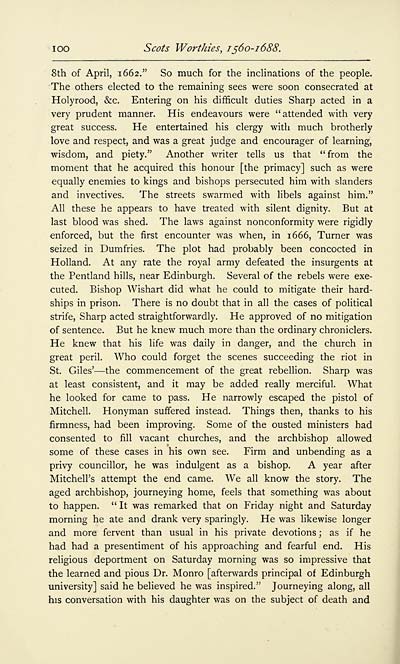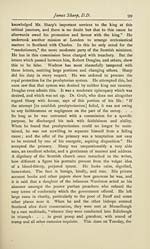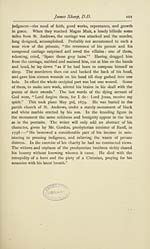Scots worthies, 1560-1688
(120) Page 100 - Robert Leighton, Bishop of Dunblane, Commendator of Glasgow
Download files
Complete book:
Individual page:
Thumbnail gallery: Grid view | List view

IOO Scots Worthies, i 560-1688.
8th of April, 1662." So much for the inclinations of the people.
The others elected to the remaining sees were soon consecrated at
Holyrood, &c. Entering on his difficult duties Sharp acted in a
very prudent manner. His endeavours were "attended with very
great success. He entertained his clergy with much brotherly
love and respect, and was a great judge and encourager of learning,
wisdom, and piety." Another writer tells us that " from the
moment that he acquired this honour [the primacy] such as were
equally enemies to kings and bishops persecuted him with slanders
and invectives. The streets swarmed with libels against him."
All these he appears to have treated with silent dignity. But at
last blood was shed. The laws against nonconformity were rigidly
enforced, but the first encounter was when, in 1666, Turner was
seized in Dumfries. The plot had probably been concocted in
Holland. At any rate the royal army defeated the insurgents at
the Pentland hills, near Edinburgh. Several of the rebels were exe-
cuted. Bishop Wishart did what he could to mitigate their hard-
ships in prison. There is no doubt that in all the cases of political
strife, Sharp acted straightforwardly. He approved of no mitigation
of sentence. But he knew much more than the ordinary chroniclers.
He knew that his life was daily in danger, and the church in
great peril. Who could forget the scenes succeeding the riot in
St. Giles' — the commencement of the great rebellion. Sharp was
at least consistent, and it may be added really merciful. What
he looked for came to pass. He narrowly escaped the pistol of
Mitchell. Honyman suffered instead. Things then, thanks to his
firmness, had been improving. Some of the ousted ministers had
consented to fill vacant churches, and the archbishop allowed
some of these cases in his own see. Firm and unbending as a
privy councillor, he was indulgent as a bishop. A year after
Mitchell's attempt the end came. We all know the story. The
aged archbishop, journeying home, feels that something was about
to happen. " It was remarked that on Friday night and Saturday
morning he ate and drank very sparingly. He was likewise longer
and more fervent than usual in his private devotions ; as if he
had had a presentiment of his approaching and fearful end. His
religious deportment on Saturday morning was so impressive that
the learned and pious Dr. Monro [afterwards principal of Edinburgh
university] said he believed he was inspired." Journeying along, all
his conversation with his daughter was on the subject of death and
8th of April, 1662." So much for the inclinations of the people.
The others elected to the remaining sees were soon consecrated at
Holyrood, &c. Entering on his difficult duties Sharp acted in a
very prudent manner. His endeavours were "attended with very
great success. He entertained his clergy with much brotherly
love and respect, and was a great judge and encourager of learning,
wisdom, and piety." Another writer tells us that " from the
moment that he acquired this honour [the primacy] such as were
equally enemies to kings and bishops persecuted him with slanders
and invectives. The streets swarmed with libels against him."
All these he appears to have treated with silent dignity. But at
last blood was shed. The laws against nonconformity were rigidly
enforced, but the first encounter was when, in 1666, Turner was
seized in Dumfries. The plot had probably been concocted in
Holland. At any rate the royal army defeated the insurgents at
the Pentland hills, near Edinburgh. Several of the rebels were exe-
cuted. Bishop Wishart did what he could to mitigate their hard-
ships in prison. There is no doubt that in all the cases of political
strife, Sharp acted straightforwardly. He approved of no mitigation
of sentence. But he knew much more than the ordinary chroniclers.
He knew that his life was daily in danger, and the church in
great peril. Who could forget the scenes succeeding the riot in
St. Giles' — the commencement of the great rebellion. Sharp was
at least consistent, and it may be added really merciful. What
he looked for came to pass. He narrowly escaped the pistol of
Mitchell. Honyman suffered instead. Things then, thanks to his
firmness, had been improving. Some of the ousted ministers had
consented to fill vacant churches, and the archbishop allowed
some of these cases in his own see. Firm and unbending as a
privy councillor, he was indulgent as a bishop. A year after
Mitchell's attempt the end came. We all know the story. The
aged archbishop, journeying home, feels that something was about
to happen. " It was remarked that on Friday night and Saturday
morning he ate and drank very sparingly. He was likewise longer
and more fervent than usual in his private devotions ; as if he
had had a presentiment of his approaching and fearful end. His
religious deportment on Saturday morning was so impressive that
the learned and pious Dr. Monro [afterwards principal of Edinburgh
university] said he believed he was inspired." Journeying along, all
his conversation with his daughter was on the subject of death and
Set display mode to:
![]() Universal Viewer |
Universal Viewer | ![]() Mirador |
Large image | Transcription
Mirador |
Large image | Transcription
Images and transcriptions on this page, including medium image downloads, may be used under the Creative Commons Attribution 4.0 International Licence unless otherwise stated. ![]()
| Histories of Scottish families > Scots worthies, 1560-1688 > (120) Page 100 - Robert Leighton, Bishop of Dunblane, Commendator of Glasgow |
|---|
| Permanent URL | https://digital.nls.uk/95152466 |
|---|---|
| Description | A selection of almost 400 printed items relating to the history of Scottish families, mostly dating from the 19th and early 20th centuries. Includes memoirs, genealogies and clan histories, with a few produced by emigrant families. The earliest family history goes back to AD 916. |
|---|

